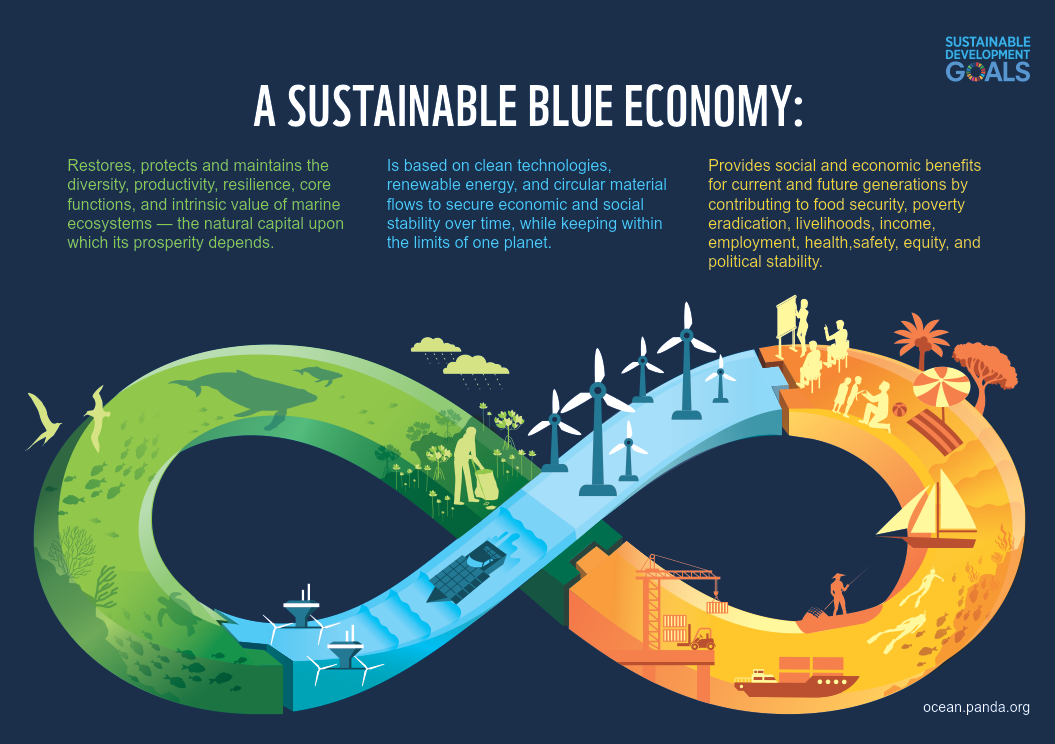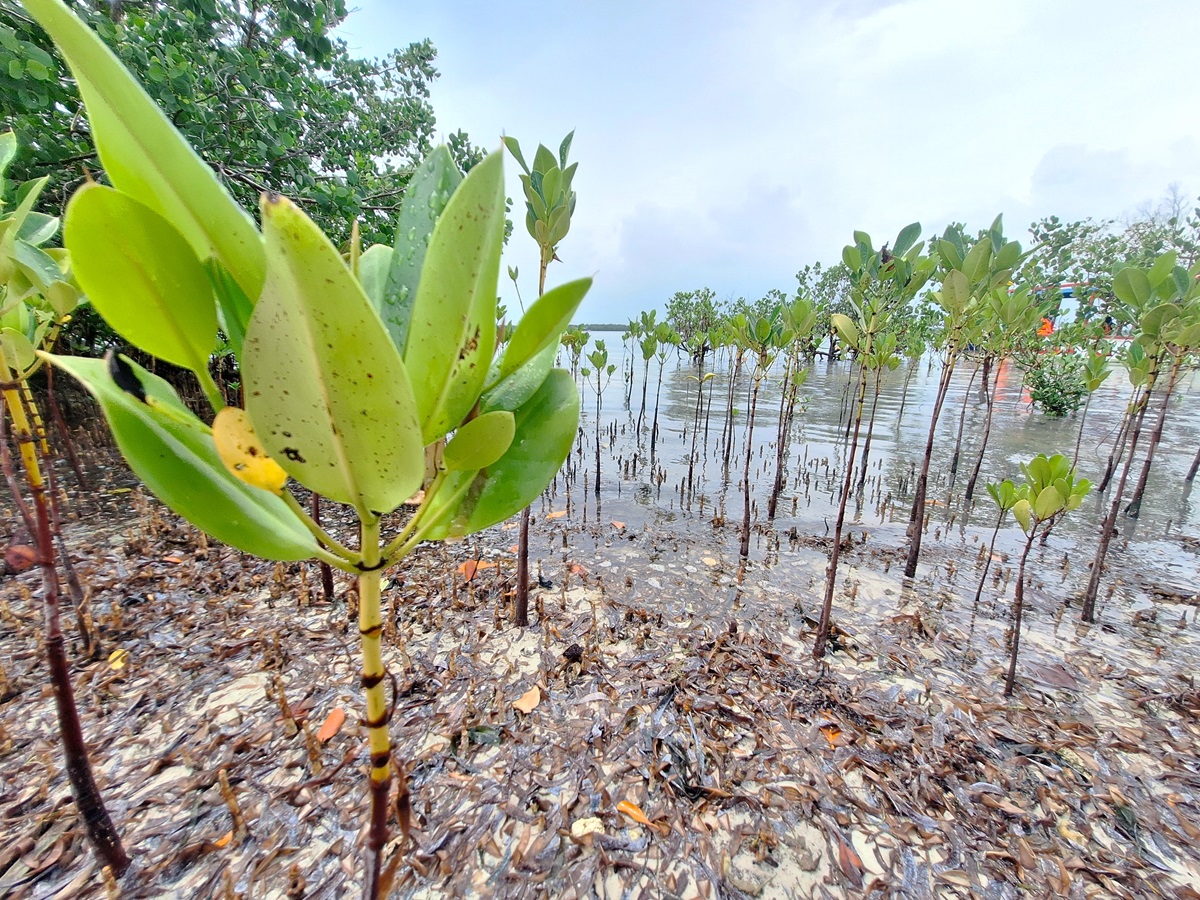A sustainable, equitable, and inclusive ocean economy for coastal communities
Main image, Figure 1. Children helping with a harvest of rabbitfish (Siganidae) for a cultural festival in Solomon Islands. © Louisa Evans.
Louisa Evans, Pamela Buchan, Matt Fortnam, Maria Honig, and Louise Heaps.
The UN Decade of Ocean Science for Sustainable Development (2021–2030) signifies a new level of policy and research attention on the ocean. It provides an important opportunity to advance a more socially just and sustainable blue economy, critical to achieving the Sustainable Development Goals. These include SDG 14, Life Below Water, which sets out ambitious targets for the conservation and sustainable use of the ocean and for improving the lives of millions of people living in coastal communities globally, whose livelihoods and wellbeing depend on healthy marine ecosystems.
The idea of a so-called blue economy emerged as an offshoot of the green economy, to emphasize the importance of sustainably managing the ocean. It has since taken on different meanings. In some cases, it has morphed into blue growth, a blue acceleration to develop the ocean frontier as space and resources on land run out. A sustainable blue economy, however, remains grounded in sustainability principles. In addition, social justice is receiving growing attention in policy discussions on the blue economy.
Blue growth—a risky business
The rate of acceleration in ocean development is unprecedented, with the ocean economy estimated to generate up to US$3 trillion annually by 2030. Seafood is the fastest growing food industry; coastal tourism is the fastest growing tourism sector; shipping accounts for at least 80 per cent of global trade; and more than 1.3 million km2 of the seabed is currently licensed for deep-sea mining exploration. These expanding ocean activities create new risks and opportunities for coastal communities. Industries built upon healthy ocean ecosystems, such as small-scale fisheries, coastal aquaculture, seaweed farming, and eco-tourism, deliver the most benefits to coastal communities. They are also the most vulnerable to negative and cumulative impacts from this unprecedented blue growth. Impacts can involve direct competition for space, for example with drilling or shipping, or can build up indirectly through adverse impacts on the ecosystems that coastal communities depend on. Importantly, because of how intimately ocean currents and ecosystems are connected, even offshore activities such as deep-sea mining and industrial fishing can impact coastal ecosystems and communities.

Figure 2. The three pillars of a sustainable blue economy as captured in WWF’s infinity loop. © WWF-International.
These direct and indirect impacts can compromise the lives, livelihoods, food and nutritional security, and rights of coastal communities. Over a billion low-income people depend on small-scale fisheries as a primary source of protein and micro-nutrients (Fig. 1). Yet, many people living in coastal communities have been dispossessed of the marine resources they depend on, with development and urban reclamation responsible for the displacement of many communities. Overlaying this, increased market integration has shifted the balance between local, domestic, and export markets; for example, by promoting seafood for tourists and international consumers. Unfortunately, to date, the blue growth agenda has proved effective neither in meeting the diverse needs of coastal communities, nor in ensuring healthy oceans for current and future generations.
Promoting an equitable, inclusive, and sustainable blue economy
A sustainable blue economy, in which ecosystem protection and recovery are central and the benefits from sustainable use are shared more equitably, may provide a vital window of opportunity for coastal communities (Fig. 2). Direct benefits to livelihoods and food security can come from better-managed fisheries and ecosystems, sustainable mariculture production of a diversity of seafood, including shellfish and seaweed, and value chains that add worth through direct marketing, fair trade and eco-labelling. Community-based enterprises that bolster local and national self-sufficiency were found to be vital for coastal resilience during the recent COVID-19 pandemic. Higher-level national benefits are also expected from job creation, increased rents from new or expanded ocean uses, ethical investment, and improved infrastructure and technology. A more inclusive, equitable and sustainable blue economy can be founded on the three core pillars of social justice: better recognition of diverse peoples’ cultures, knowledge, rights and needs; transparent and inclusive processes of decisionmaking; and mechanisms to ensure fair distribution of costs and benefits. Indeed, coastal communities and supporting organizations already employ many strategies that invoke social justice to address the barriers they face. Examples include efforts to secure territorial and tenure rights for Indigenous peoples, documenting customary or traditional uses of the ocean and their cultural and economic value, targeting capacity development towards more marginalized groups, and lobbying governments to improve enforcement of existing ocean regulation.
Box 1 - Safeguarding mangrove services
The Mikoko Pamoja project in Gazi Bay, Kenya, is the world’s first mangrove Payments for Ecosystem Services (PES) project. As of 2020, approximately 117 hectares of natural and planted mangrove forests are under a collaborative management regime between communities, government agencies, and NGOs, with carbon credits verified through Plan Vivo and sold on the international voluntary carbon market3.

By raising income from stacked services, including carbon credits, and other income generating activities such as beekeeping and ecotourism, the project safeguards the mangroves and the multiple services they provide to the local community. The project generates US$24,000/ annum in PES payments for the community and, importantly, strives for fairness in its decision-making and benefit sharing.
Where do we go from here?
Some policy players are fully embracing the opportunities offered by the sustainable blue economy agenda. For instance, the Seychelles has designated a Department of the Blue Economy and developed a Blue Economy Roadmap. Elsewhere, the implications are more dispersed, but the critical work to bring social justice considerations to the forefront of sustainability initiatives is equally relevant in areas such as biodiversity conservation, climate resilience, and fisheries management (see Box).
Fortunately, there are various policy frameworks and multilateral efforts driving a global movement for coastal communities, built on a growing recognition that a healthy and resilient ocean is humanity’s essential ally as we address our combined nature, climate, and biodiversity crisis. The Global Biodiversity Framework1(adopted December 2022) includes a commitment to protect, conserve, and equitably govern at least 30 per cent of the world’s land, water, and ocean, while recognizing and respecting the rights of Indigenous peoples and local communities to their territories and waters. Within the United Nations Framework Convention on Climate Change (UNFCCC) processes, there is a concerted effort to address ocean-climate challenges, emphasizing the role of coastal and marine ecosystems in climate mitigation and adaptation. These processes also recognize the contributions of Indigenous peoples, tackle loss and damage, and facilitate cooperative approaches for emission reductions. The sustainable resource management of aquatic food systems underscores the importance of sustainable practices in fisheries and aquaculture, aligning with UNFCCC objectives by reducing environmental impacts and ensuring access to nutritious food for coastal communities.
After several decades of struggle, small-scale fisheries have managed to obtain a broad recognition for the role they play in food security, livelihoods, economies, culture, and wellbeing2. A first Small-Scale Fisheries (SSF) Summit was organized back to back with the 35th Session of UN FAO’s Committee on Fisheries (COFI 35). For the first time, this brought together SSF networks, NGOs, and FAO agencies to jointly ask that SSF representatives are included in decision-making processes, to move forward the implementation of the Voluntary Guidelines for Securing Sustainable Small-Scale Fisheries in the Context of Food Security and Poverty Eradication, and to apply a human rightsbased approach to fishery management.
Ocean governance, in all its manifestations, can no longer be ‘equity-blind’ when the fates of coastal communities are so intricately tied to the outcomes for marine ecosystems. Nor can it be blind to the significant role coastal communities play as stewards of many of our fragile coastal ecosystems. There will likely be many mutually reinforcing benefits from considering the social and environmental pillars of a sustainable blue economy together more meaningfully.
Louisa Evans (Louisa.evans@exeter.ac.uk), Pamela Buchan (pb381@ exeter.ac.uk), Matt Fortnam (M.Fortnam@exeter.ac.uk), Maria Honig (mhonig@wwfmedpo.org), and Louise M. Heaps (LHeaps@wwf.org.uk)
Further reading Evans, L., Buchan, P.M., Fortnam, M., Honig, M., and Heaps, L. 2023. Putting coastal communities at the centre of a sustainable blue economy: A review of risks, opportunities, and strategies. Frontiers in Political Science, 4: 1032204
Jouffray, J.-B., Blasiak, R., Norström, A. V., Österblom, H., and Nyström, M. 2020. The blue acceleration: the trajectory of human expansion into the ocean. One Earth. 2, 43–54. doi: 10.1016/j.oneear.2019.12.016
Crona, B., Wassénius, E., Lillepold, K., Watson, R., Selig, E., Hicks, C., et al. 2021. Sharing the seas: a review and analysis of ocean sector interactions. Environ. Res. Lett. 16, 6. doi: 10.1088/1748-9326/ac02ed
Okafor-Yarwood, I., Kadagi, N. I., Miranda, N. A., Uku, J., Elegbede, I. O., and Adewumi, I. J. 2020. The blue economy–cultural livelihood– ecosystem conservation triangle: the African experience. Front. Mar. Sci. 7, 586. doi: 10.3389/fmars.2020.00586
Österblom, H., Wabnitz, C. C. C., and Tladi, D. 2020. Towards Ocean Equity. Washington, DC: World Resources Institute. https://oceanpanel. org/publication/towards-ocean-equity/ 1 https://www.cbd.int/gbf/ 2 Achieved during the International Year of Artisanal Fisheries and Aquaculture 2022 (IYAFA 2022)
2. [Achieved during the International Year of Artisanal Fisheries and Aquaculture 2022 (IYAFA 2022)]
